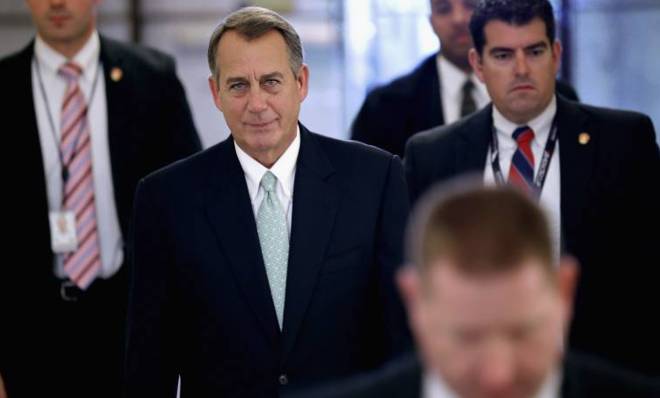Will the House sink a Senate deal on the debt?
Harry Reid and Mitch McConnell are on the verge of a deal to deliver us from financial calamity. Your move, John Boehner.


Late Monday, Senate leaders sounded optimistic that a bipartisan deal to reopen the federal government and raise the debt ceiling was close to fruition. "We've made tremendous progress," Senate Majority Leader Harry Reid (D-Nev.) said Monday evening. "We hope with good fortune... perhaps tomorrow will be a bright day."
Senate Minority Leader Mitch McConnell (R-Ky.), who came off the sidelines to start negotiating the deal with Reid over the weekend, agreed. "We've had a good day," he said, touting "substantial progress" toward an end to the fiscal standoff in Washington.
The centerpiece of the emerging deal is an agreement to finance the federal government until January 15 and raise the debt limit until about February 7. There would also be two minor changes to ObamaCare: A yearlong delay of a $63-per-person annual reinsurance fee temporarily imposed on employers and unions, and stronger verification requirements for people seeking government subsidies under the law. Finally, there would be a commitment to complete a long-term budget plan by mid-December.
The Week
Escape your echo chamber. Get the facts behind the news, plus analysis from multiple perspectives.

Sign up for The Week's Free Newsletters
From our morning news briefing to a weekly Good News Newsletter, get the best of The Week delivered directly to your inbox.
From our morning news briefing to a weekly Good News Newsletter, get the best of The Week delivered directly to your inbox.
The optimistic scenario for those who don't want the U.S. to default late Thursday is this: Reid and McConnell finalize the details on Tuesday and present the deal to their caucuses; the Senate approves the plan on Wednesday; and House Speaker John Boehner (R-Ohio) feels compelled to bring the bill up for a vote, passing it with a large number of Democrats and some portion of his own restive House caucus.
There are a number of potential pitfalls here that should be immediately obvious to anyone with even a passing interest in the current state of Washington. First, it would have to get out of the Senate. That's likely, considering the plan's parameters were hammered out by a bipartisan group of senators and Senate Republicans are getting increasingly anxious about how badly their party is faring in the polls. But remember, this is the Senate.
Justin Green at Businessweek says the Senate can push this package through pretty quickly, as an amendment to the "clean" budget bill it has already passed — but only if senators give unanimous consent. Any single senator, he notes, can gum up the works, sparking several 30-hour debate periods.
That means "Sen. Ted Cruz (R-Tex.), who basically forced the shutdown and whose own private polls have convinced him that it has been a glorious success, at this point could probably force a default and global economic calamity on his own," Green explains. Still, Cruz or any other senator could only postpone a vote until maybe Friday, no further.
A free daily email with the biggest news stories of the day – and the best features from TheWeek.com
The House, which could ignore or derail the deal, is the cause for real concern, however.
Boehner "provided no assurances on Monday that an arrangement hammered out by his Senate colleagues could pass muster among his conservatives," say Michael D. Shear and Jeremy W. Peters at The New York Times. Somewhat ominously, it's "already clear that the most conservative members of the House were not going to go along quietly with a plan that does not accomplish their goal from the outset of this two-week-old crisis: Dismantling the president's health-care law."
A deal with McConnell's imprimatur "may matter in some psychological or sense in terms of 'optics,'" says Slate's Matthew Yglesias. "But in the real world what matters is what the House GOP leadership wants to do." That means the fate of the economy is basically in Boehner's hands. That's not too reassuring, Yglesias adds. "So far throughout this crisis, Boehner and his team have put caucus unity ahead of the good of the economy."
"If Boehner allows a vote, the Senate deal likely passes the House" with a minority of House Republicans, says Paul Mirengoff at PowerLine. And this time he will probably waive the so-called Hastert Rule, especially if he can "extract another fig leaf or two" out of the Senate. The bottom line: "Right now, I think the Republican leadership in both houses just wants to stop the bleeding."
The great hope in Washington is that a bipartisan Senate deal will "'jam' the House and force its hand, with enough moderate Republicans joining with Democrats to pass the bill and avoid default," says David Graham at The Atlantic. "But the House, with its staunch band of GOP hard-liners, has been tough to count on for anything," and there's really nothing in the plan for the Tea Party faction but "a serious rout."
The main substantive outcome of the deal, though, would be that it kicks the budgetary can down the road. "Perhaps Republicans will have been so bloodied by this shutdown that they'll be reluctant to risk" another shutdown or debt-limit crisis, but they'll be playing on more favorable turf, Graham says. Still, the truth is that nobody seems to know what the House Republicans will do, and where exactly they're drawing their lines in the sand. Graham concludes:
That all adds up to a jittery few days. It's good news that things seem to be moving, but whether the thaw will prevent default and reopen the government is unlikely to be clear until just about the last moment. [The Atlantic]
Peter has worked as a news and culture writer and editor at The Week since the site's launch in 2008. He covers politics, world affairs, religion and cultural currents. His journalism career began as a copy editor at a financial newswire and has included editorial positions at The New York Times Magazine, Facts on File, and Oregon State University.
-
 NASA discovered 26 microbes in their cleanrooms
NASA discovered 26 microbes in their cleanroomsUnder the radar The bacteria could contaminate space
-
 The elite falcon trade in the Middle East
The elite falcon trade in the Middle EastUnder the Radar Popularity of the birds of prey has been ‘soaring’ despite doubts over the legality of sourcing and concerns for animal welfare
-
 A running list of the international figures Donald Trump has pardoned
A running list of the international figures Donald Trump has pardonedin depth The president has grown bolder in flexing executive clemency powers beyond national borders
-
 The billionaires’ wealth tax: a catastrophe for California?
The billionaires’ wealth tax: a catastrophe for California?Talking Point Peter Thiel and Larry Page preparing to change state residency
-
 Bari Weiss’ ‘60 Minutes’ scandal is about more than one report
Bari Weiss’ ‘60 Minutes’ scandal is about more than one reportIN THE SPOTLIGHT By blocking an approved segment on a controversial prison holding US deportees in El Salvador, the editor-in-chief of CBS News has become the main story
-
 Has Zohran Mamdani shown the Democrats how to win again?
Has Zohran Mamdani shown the Democrats how to win again?Today’s Big Question New York City mayoral election touted as victory for left-wing populists but moderate centrist wins elsewhere present more complex path for Democratic Party
-
 Millions turn out for anti-Trump ‘No Kings’ rallies
Millions turn out for anti-Trump ‘No Kings’ ralliesSpeed Read An estimated 7 million people participated, 2 million more than at the first ‘No Kings’ protest in June
-
 Ghislaine Maxwell: angling for a Trump pardon
Ghislaine Maxwell: angling for a Trump pardonTalking Point Convicted sex trafficker's testimony could shed new light on president's links to Jeffrey Epstein
-
 The last words and final moments of 40 presidents
The last words and final moments of 40 presidentsThe Explainer Some are eloquent quotes worthy of the holders of the highest office in the nation, and others... aren't
-
 The JFK files: the truth at last?
The JFK files: the truth at last?In The Spotlight More than 64,000 previously classified documents relating the 1963 assassination of John F. Kennedy have been released by the Trump administration
-
 'Seriously, not literally': how should the world take Donald Trump?
'Seriously, not literally': how should the world take Donald Trump?Today's big question White House rhetoric and reality look likely to become increasingly blurred
